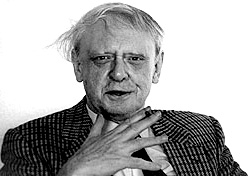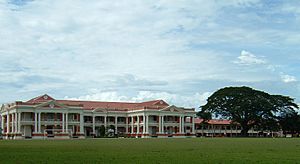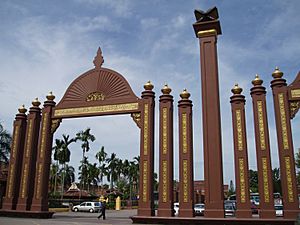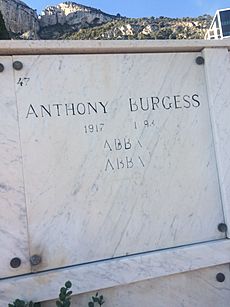Anthony Burgess facts for kids
Quick facts for kids
Anthony Burgess
FRSL
|
|
|---|---|

Burgess in 1986
|
|
| Born | John Burgess Wilson 25 February 1917 Harpurhey, Manchester, England |
| Died | 22 November 1993 (aged 76) St John's Wood, London, England |
| Pen name | Anthony Burgess, John Burgess Wilson, Joseph Kell |
| Occupation |
|
| Alma mater | Victoria University of Manchester (BA English Literature) |
| Period | 1956–1993 |
| Notable awards | Commandeur des Arts et des Lettres, distinction of France Monégasque, Commandeur de Merite Culturel (Monaco), Fellow of the Royal Society of Literature, honorary degrees from St Andrews, Birmingham and Manchester universities |
| Spouse |
Llewela Isherwood Jones
(m. 1942; died 1968)Liana Macellari
(m. 1968) |
| Children | Paolo Andrea (1964–2002) |
| Signature | |
 |
|
Anthony Burgess (born John Anthony Burgess Wilson; February 25, 1917 – November 22, 1993) was a famous English writer and composer. He is best known for his book A Clockwork Orange. This book was made into a well-known film by Stanley Kubrick in 1971.
Burgess wrote many other novels, plays, and screenplays. He also worked as a critic and studied famous writers like James Joyce. He was very good with languages, teaching about sounds in speech and translating plays and operas. He also wrote over 250 pieces of music. Burgess saw himself as much a composer as a writer, even though he was more successful with his books.
Contents
Biography
Early Life and Family
Anthony Burgess was born on February 25, 1917, in Harpurhey, a part of Manchester, England. His parents, Joseph and Elizabeth Wilson, were Catholic shopkeepers. He grew up during the Great Depression, but his family was fairly well off.
As a child, he was called Jack or Johnny Eagle. When he was confirmed in the Catholic Church, he added the name Anthony. He started using "Anthony Burgess" as his pen name when his first novel, Time for a Tiger, was published in 1956.
His mother, Elizabeth, died at age 30 in 1918 during the 1918 flu pandemic. His sister Muriel had died just four days earlier from the same illness. Burgess believed his father, Joseph, was upset that he had survived while his mother and sister did not.
After his mother's death, Burgess was raised by his aunt, Ann Bromley. His father worked as a bookkeeper and played piano in a pub. In 1922, his father married the pub's landlady, Margaret Dwyer. They later opened a tobacconist shop. Burgess worked there briefly as a child. His father died in 1938, and his stepmother died in 1940.
Burgess often said his childhood was lonely. He felt "despised" and was sometimes picked on by other boys. He went to Catholic schools, St. Edmund's Elementary School and Bishop Bilsborrow Memorial Elementary School. He was a good student and could read before most other children. This helped him get into Xaverian College.
Music and University
Burgess wasn't interested in music until he heard a flute solo on his radio. He was amazed and learned it was Prélude à l'après-midi d'un faune by Claude Debussy. He wanted to be a composer, but his family said there was no money in it. He taught himself to play the piano around age 14.
He wanted to study music at the Victoria University of Manchester, but his grades in physics were not good enough. Instead, he studied English language and literature from 1937 to 1940. He earned a Bachelor of Arts degree.
Marriage
Burgess met Llewela "Lynne" Isherwood Jones at university. They married on January 22, 1942. Lynne studied economics, politics, and modern history.
Military Service
In 1940, Burgess joined the British Army. He worked as a nursing orderly. He was later transferred to the Army Educational Corps and became a sergeant.
He was stationed in Gibraltar, where he taught speech and drama. He taught German, French, and Spanish. His language skills were noticed by army intelligence. He helped with debriefings of Dutch and Free French refugees. He was even arrested briefly in Spain for insulting Francisco Franco, but was released.
Early Teaching Career
Burgess left the army in 1946. For the next four years, he taught speech and drama at two teacher training colleges. He also taught at Birmingham University.
In 1950, he became a secondary school teacher at Banbury Grammar School. He taught English literature, supervised sports, and ran the school's drama club. He put on plays with local people and students. His former students said he cared a lot about teaching.
With help from Lynne's father, they bought a cottage in Adderbury. Burgess named it "Little Gidding" after a poem by T. S. Eliot. He also started writing articles for the local newspaper, the Banbury Guardian.
Life in Malaya and Brunei
In 1954, Burgess became a teacher and education officer in Malaya. He taught at the Malay College in Kuala Kangsar. He also looked after students in the preparatory school. He wrote music there that was inspired by the country.
After a disagreement with the college principal, Burgess was moved to the Malay Teachers' Training College in Kota Bharu. He became very good at the Malay language, both speaking and writing. He even got a pay raise for it.
In Malaya, he started writing novels in his free time. He published his first books: Time for a Tiger, The Enemy in the Blanket, and Beds in the East. These three books are known as The Malayan Trilogy.
After a short trip to Britain in 1958, Burgess took another job in the East, this time in Brunei. He taught at the Sultan Omar Ali Saifuddin College. In Brunei, he started writing the novel Devil of a State.
Around this time, Burgess collapsed while teaching. He was told he had an inoperable brain tumour and only a year to live. This made him write many novels quickly to earn money for his wife. However, he later suggested that he was forced to leave the Colonial Service for political reasons, not health reasons. He said his wife had upset the Duke of Edinburgh during a visit. He also supported a local political party.
Becoming a Full-Time Writer
Burgess returned home in 1959. Doctors found no illness, so he decided to become a full-time writer. He used money his wife Lynne inherited and their savings. They lived in Hove, then Etchingham, and later Chiswick.
In 1961, Burgess took a sea trip to Leningrad. While relearning Russian on this trip, he found inspiration for the made-up slang called Nadsat in his novel A Clockwork Orange.
Lynne Burgess died on March 20, 1968. Six months later, Burgess married Liana Macellari, an Italian translator. He adopted her four-year-old son, Paolo Andrea.
Later Life and Travels
To avoid high taxes in Britain, Burgess and his family moved out of the country. They traveled through Europe in a motor-home. Burgess wrote in the back of the van while Liana drove.
They lived in Lija, Malta, for two years. After some issues there, they moved to Italy. They had a flat in Rome and a country house. In 1975, Burgess decided to move to Monaco to avoid taxes and for safety reasons. He also had a villa in France.
Burgess spent two years in the United States as a visiting professor at different universities. He taught creative writing at Princeton University, City College of New York, and Columbia University. He also lectured at the University of Iowa. In 1976, he settled in Monaco. He helped start the Princess Grace Irish Library there in 1984.
He lived near Graham Greene, another famous writer, but they stopped talking after Burgess appeared on TV to discuss his books. Burgess also spent a lot of time at his chalet in Switzerland.
Death
Anthony Burgess died on November 22, 1993, from lung cancer. He passed away in a London hospital. His ashes were buried in the Monaco Cemetery.
His memorial stone reads "Abba Abba," which means "Father, father" in ancient languages. This phrase is from the Bible and is also the title of one of Burgess's novels. Many people, including other writers, spoke at his memorial service. The Times newspaper called him "a great moralist."
Life in Music
Many of Burgess's musical pieces were played on BBC Radio. His Symphony No. 3 in C was first performed in Iowa City in 1975. He described his Sinfoni Melayu as an attempt to mix the musical sounds of Malaya.
The structure of his novel Napoleon Symphony: A Novel in Four Movements (1974) was based on Beethoven's Eroica symphony. His book Mozart and the Wolf Gang (1991) tried to sound like Mozart's music.
Beethoven's Symphony No. 9 is very important in A Clockwork Orange and the film. Many of his unreleased compositions are listed in his book This Man and Music. He wrote a lot of music for the recorder because his son played it.
Burgess translated the words for the opera Carmen, which was performed by the English National Opera. He also wrote for the 1973 Broadway musical Cyrano. In 1982, he created Blooms of Dublin, an operetta based on James Joyce's Ulysses.
Linguistics
Burgess's training in languages helped him create interesting dialogue in his books. While in Malaya, he learned the Persian language. He even translated T. S. Eliot's The Waste Land into Persian, though it was never published.
His published translations include two versions of Cyrano de Bergerac, Oedipus the King, and Carmen.
Burgess's love for language is clear in the made-up, Anglo-Russian teen slang called Nadsat in A Clockwork Orange. He also invented a prehistoric language called Ulam for the movie Quest for Fire (1981). He wrote books about linguistics, like Language Made Plain and A Mouthful of Air.
Work
Novels
His first published books were the Malayan trilogy, The Long Day Wanes. This included Time for a Tiger, The Enemy in the Blanket, and Beds in the East. Devil of a State is a follow-up, set in a made-up version of Brunei. Burgess wanted to be the best writer about Malaya.
His books from the 1960s include Enderby and The Right to an Answer, which talks about death. One Hand Clapping makes fun of popular culture.
His famous dystopian novel, A Clockwork Orange, came out in 1962. The book explores ideas about free will and what is right or wrong. Burgess once said he wrote it quickly for money. The American version of the book was missing the final chapter. This meant the film version by Stanley Kubrick also left out the ending.
Nothing Like the Sun: A Story of Shakespeare's Love Life is a fictional story about William Shakespeare's love life. This novel was highly praised and made Burgess a top writer of his time. Beard's Roman Women was a very personal book, dealing with the death of his first wife and his new marriage.
In Napoleon Symphony, Burgess brought Bonaparte to life. The book's structure was based on Beethoven's Eroica symphony. In the 1980s, his books often had religious themes, like The Kingdom of the Wicked and Earthly Powers. Even though Burgess stopped being a strict Catholic when he was young, his Catholic background influenced his work.
Burgess kept writing even when he was very ill. His late novel Any Old Iron tells the story of two families through major historical events. A Dead Man in Deptford is about Christopher Marlowe and is a companion to Nothing Like the Sun. The novel Byrne was published after he died.
After Burgess's death, another writer, Adam Roberts, finished a novel Burgess had started about the Black Prince. In 2019, a never-before-seen analysis of A Clockwork Orange by Burgess himself was found. It was called "The Clockwork Condition."
Critical Studies
Burgess began his career as a critic. He wrote English Literature, A Survey for Students for new students. He also wrote books about novels, like The Novel To-day. He wrote studies about James Joyce, including Here Comes Everybody. His entry on the novel in the 1970 Encyclopædia Britannica is considered a classic. Burgess also wrote about William Shakespeare, Ernest Hemingway, and D. H. Lawrence.
Screenwriting
Burgess wrote screenplays for several films and TV shows. These included Moses the Lawgiver (1974), Jesus of Nazareth (1977), and A.D. (1985). He also helped write the TV series Sherlock Holmes and Doctor Watson (1980).
He created a Stone Age language for the movie Quest for Fire (1981). Burgess also wrote a screenplay for a James Bond film, The Spy Who Loved Me, which was never used.
Archive
The largest collection of Anthony Burgess's belongings is at the International Anthony Burgess Foundation in Manchester, UK. It includes his journals, over 8,000 books from his personal library, and manuscripts of his novels and music. There are also photos, sound recordings, musical instruments, and letters from other famous writers. Burgess's wife, Liana, started the foundation in 2003.
Another large collection of his papers is at the Harry Ransom Center at the University of Texas at Austin. This archive has many typed and handwritten manuscripts, sheet music, letters, and personal items. It also contains many unpublished musical compositions.
Honours
- Burgess received the Commandeur des Arts et des Lettres from France.
- He also became a Monégasque Commandeur de Merite Culturel in Monaco.
- He was a Fellow of the Royal Society of Literature.
- In 1991, he was given the title of Companion of Literature by the Royal Society of Literature.
- He received honorary degrees from St Andrews, Birmingham, and Manchester universities.
- His novel Earthly Powers was nominated for the 1980 English Booker Prize for fiction.
Commemoration
- The International Anthony Burgess Foundation has a performance space and café-bar in Manchester.
- The University of Manchester put up a plaque in October 2012. It says: "The University of Manchester commemorates Anthony Burgess, 1917–1993, Writer and Composer, Graduate, BA English 1940". This was the first monument to Burgess in the United Kingdom.
Selected works
Novels
|
|
Images for kids
See also
 In Spanish: Anthony Burgess para niños
In Spanish: Anthony Burgess para niños
 | Aaron Henry |
 | T. R. M. Howard |
 | Jesse Jackson |





